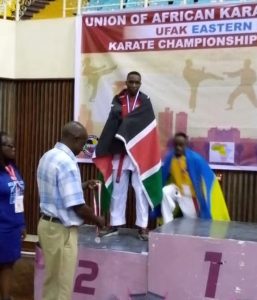Across different spheres of society, there is rising recognition of the power of art and creatives in promoting diversity, inclusion and equality, which is central to achieving Agenda 2030 – Sustainable development goals. From social inclusion to gender equality, climate change, and digital technologies impact on how we live and work, the art and creatives industry is at the forefront of creating and amplifying solutions that promote sustainable and inclusive societies. Celebrating the creative economy during the World Creative and Innovation Day 2021, the United Nations recognized art and creative industries as an emerging solution to some of the most pressing problems such as poverty eradication – #SDG1 and the elimination of hunger-#SDG2.
Unfortunately, inequality in art and creative spaces still persist, particularly in developing countries, including Kenya. Underlying income inequalities limit art access among children and youth. Children from low-income households have a lower likelihood of being involved in art-related hobbies or art education, which reduces their opportunities as they progress in their lives and to call forth their own talents. These children are likely to attend schools, both public and private, that are struggling with essentials such as classrooms, desks, stationery, teachers, etc., such that access to art and creative resources would be considered a luxury.
While children are more likely to be engaged in art activities in the early years of schooling, engagement drops off as children grow older. The reduction in arts subjects being taught in schools as the children advances impact on those who are not encouraged or cannot afford to engage outside of school dis-proportionally.
Different forms of disability further constrain the access to art by children and youth. For example, non-disabled children and young people are more likely to visit art centers with their school than their disabled peers, with special schools less likely to visit art venues.
The Art for Children (A4C) Foundation is founded on the belief that engagement of children and youths in art and creatives, particularly those from low household incomes, in early formative years reduces the effects of disadvantage on educational attainment. We are looking for ways to foster every child’s & youth’s possibility of participating in arts education and learning through the arts to support their learning, school engagement, and well-being. A4C long-term goal is to promote the agenda that every child and young person has the opportunity to experience the richness of arts. We aim to use our different artistic and creatives engagement platforms to further ‘values’ and ‘experiences’ contributing to openness and leadership, cultural exchange, social mobility, and society’s development
A4C Foundation recognizes that realizing genuine equality is a long process that requires real effort instead of quick fixes; hence our long-term vision of establishing “Ubunifu Centre”. The centre will serve as a hub for art in Nakuru County, where children and adults will get access to art lessons and materials that help them nature their artistic and creative skills. Complementing the Ubunifu Centre, HISANA (“Hii Sanaa”) uniquely supports community-based discussion on art and sustainability. The NACAMP (Nakuru Children Art and Mentorship Programme) will nurture children and youth skills in music, drama and poetry, dance, drawing, art and craft, modelling, and karate.
We see a multi-stakeholder collaboration as a critical avenue towards operationalizing these flagship projects. Therefore, we call upon interested stakeholders to join the course in supporting the operationalization of Ubunifu Centre, HISANA and NACAMP. Together, let’s turn to art and creatives and draw their full spectrum to shape our societies as we pursue equality, diversity and inclusivity.
Author: Stella Mutuku is a research and policy analyst and a leading expert on sustainable development, health education, and energy policies; a co-founder of 254 Youth Policy Café and a member of the A4C Foundation Advisory Board.







